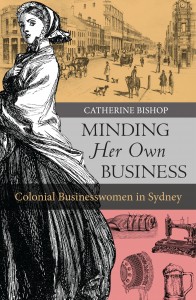… by Catherine Bishop
In late September 2015 Kelly O’Dwyer was appointed Minister for Small Business as part of new Liberal leader Malcolm Turnbull’s Cabinet reshuffle. The appointment of a woman in this position is both significant and appropriate. Recent statistics show that one third of new small businesses are started by women, while a further third are started by men and women together, meaning that women are involved in around 66 per cent of new business start-ups. More generally, women are at least a third of all small business owners. Their significance was recognised by O’Dwyer’s predecessor, Bruce Bilson – the headline of his press release, admittedly on Women’s Day in March 2015, was ‘Women Trailblazing in Small Business’. Bilson’s press release was perhaps not a surprise in 2015 – more surprising is the fact that 150 years ago, in the 1850s and 1860s, women in Australia were also ‘trailblazing in small business’.
 As Minding Her Own Business: Colonial Businesswomen in Sydney (by Catherine Bishop, publisher, NewSouth books) illustrates, there were numerous women in mid-nineteenth-century Sydney supporting themselves and their families in a variety of small businesses. At this time, between about 1830 and 1870, the dominant rhetoric in society was of female domesticity, with women given responsibility for home and children. They had few political and legal rights, especially once married, and certainly few imagined they should have the vote. Women were of the opinion that marriage and motherhood was their ‘career’ – the prevailing middle-class ideal was of a leisured wife – certainly not one engaged in business.
As Minding Her Own Business: Colonial Businesswomen in Sydney (by Catherine Bishop, publisher, NewSouth books) illustrates, there were numerous women in mid-nineteenth-century Sydney supporting themselves and their families in a variety of small businesses. At this time, between about 1830 and 1870, the dominant rhetoric in society was of female domesticity, with women given responsibility for home and children. They had few political and legal rights, especially once married, and certainly few imagined they should have the vote. Women were of the opinion that marriage and motherhood was their ‘career’ – the prevailing middle-class ideal was of a leisured wife – certainly not one engaged in business.
But financial reality for much of Sydney’s population, most of who were from working-class and trade backgrounds, meant that women’s money-making capacities were as essential to the well-being of families as those of men. And women who did not have a husband or father, or whose husbands were absent, intemperate or insolvent, had no choice but to work to survive, in this age before the dole, pensions or government relief. For women with young children, running a small business, which they could often do from home, was the most realistic solution.
Just like their male counterparts in small business, they were not always successful … or honest. A few small businesses from the nineteenth century survived into the twentieth and some female shopkeepers founded what became some of the great department store empires – although their contribution has generally been forgotten. Just like today small businesses could be shaky and sometimes shonky, and individually they seemed not to be very important. Taken together, however, they contributed considerably to turning Sydney into the city it became. Where would the good citizens of Sydney have been without the boarding house keepers to lodge them, the restaurant owners and publicans and grocers and dairy owners to feed them, the milliners and dressmakers and baby linen makers to clothe them, the schoolmistresses and dancing teachers to educate them, or the entertainers and brothel keepers to amuse them?
Yet the stories of most of these women have been forgotten – few memorials or plaques in Sydney commemorate their existence. A good number of buildings where they plied their various trades survive, but there is almost nothing acknowledging them. Minding Her Own Business gives readers a new way of looking at Sydney’s streets by telling the stories of businesswomen who exploited the burgeoning market of the growing city. As well as dressmakers and schoolteachers and boarding house keepers, there were ironmongers and combmakers and taxidermists; alongside grocers and dealers and publicans, there were butchers and newspaper proprietors and travelling phrenologists. They were some quirky, some courageous, and some tragic types, along with some disreputable and some outright scandalous characters.
We might imagine these nineteenth-century businesswomen have little in common with their tech-savvy twenty-first century counterparts, but it is surprising just how much they share. One thing in particular sticks out. When the new Minister for Small Business Kelly O’Dwyer posed for the official media photo with Malcolm Turnbull, she held her baby daughter in her arms, underscoring the new wind that has apparently swept through the government. Her dual responsibilities as mother and minister were on display – representing what the previous Minister Bruce Bilson had also noted: that many women ‘juggle family commitments’ while running small businesses. The expectation that women will do the juggling – the apparent acceptance that mothers are ultimately responsible for childcare – was a also feature of mid-nineteenth century life. It seems extraordinary that 150 years later we still do not see fathers as equally responsible for the daily care of their children. When will we ponder how businessmen juggle family responsibilities with business? When will we see male ministers posing with their children?
